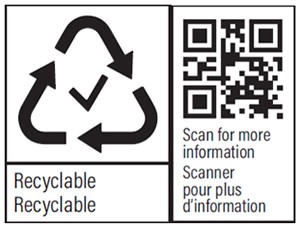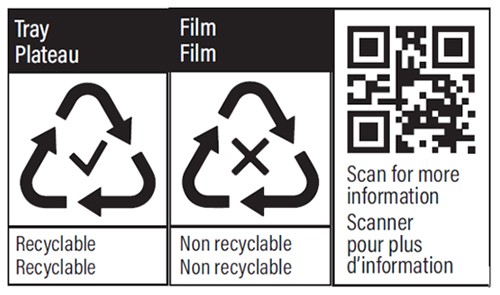Katrina Coughlin
Partner
Article
11
On April 18, 2023, the Government of Canada published proposed measures in furtherance of its zero plastic waste agenda.[1] Canada proposes three main initiatives:
Environment and Climate Change Canada launched consultations on these proposed measures, with comments due by May 18, 2023.[2]
Under the current proposal, consumer-facing plastic packaging (whether primary, secondary or e-commerce packaging) and single-use plastics (SUPs) would be required to include a prescribed icon to convey recyclability information. This includes biobased plastics made from renewable resources as well as conventional plastics.
Reusable packaging (i.e., packaging that can be used many times in a reuse or refill system) would be exempt from the labelling requirements. Exemptions from the mandatory recycling symbol requirement are also proposed for certain products (e.g., small items with a display surface of less than 15cm2).
Under the proposal, before plastic packaging or a SUP is placed on the market, it would have to undergo a recyclability assessment in each province or territory where it will be sold.[3] The assessment must consider all of the product's components against three criterion: collection, sorting and re-processing, to determine whether the product (or individual components thereof) is classified as "recyclable", "non-recyclable" or "collected."
The results of this assessment dictate the labelling requirements for the product. If all plastic aspects or components of the packaging fall within the same classification, a simplified label can be used. However, if the packaging contains multiple components that can be separated, and these components fall into different classifications, a more detailed version of the label is required.


As Figures 1 and 2 illustrate, in addition to the labelling requirements described above, labels must also include a QR code that provides Canadians with information about the item's recyclability by linking to a freely available website. The website would also have to meet detailed content and formatting requirements, as described in the proposal.
The proposal also includes a prohibition from labelling items with the terms "degradable" and "biodegradable" or any form of those terms that imply break down, fragmentation or biodegradability in the environment, in order to reduce consumer confusion.[4]
For an item to be labelled "compostable," it would be required to be certified by an accredited third party to an acceptable standard specification for compostable plastics. Compostable products would also be required to undergo in-field testing at a composting facility in Canada, be associated with organic wastes and meet specifications related to concentrations of metals, fluorine and other elements of concern.
With respect to labelling, compostable items would be classified as "non-recyclable," display the word "compostable" (with qualifying language regarding industrial composting facilities), and use green coloured labelling, striping or tinting to differentiate it from non-compostable plastic items.
The proposal would additionally introduce requirements for Price Look-Up (PLU) produce stickers to be compostable and prohibit PLU produce stickers that are non-compostable. However, PLU stickers would be exempt from the specific wording/colouring requirements.
The proposal also covers recycled content requirements for plastics,[5] which were developed following a technical issues paper released for comment in February 2022.[6] These requirements would apply to all companies selling plastic products into Canada, with the exception of companies that had a gross revenues of under $5,000,000 in the previous year or who placed fewer than ten tonnes of plastic packaging into the Canadian market in the previous year.
The measures cover two categories:
The Government of Canada released the following schedule of products that would be subject to regulation, and the proposed minimum annual percentage of recycled content:
| Packaging category | Product category | 2025 | 2026-27 | 2028-29 | 2030 |
|---|---|---|---|---|---|
| Rigid | Beverage bottles | Report only | 20% | 40% | 60% |
| Rigid | Rigid PET/HDPE | Report only | 20% | 30% | 60% |
| Rigid | Other resin types | Report only | Report only | 30% | 60% |
| Rigid | Special categories, rigid | Report only | Report only | Report only | 40% |
| Flexible | Waste bags | Report only | 10% | Subject to below targets for flexibles | Subject to below targets for flexibles |
| Flexible | Flexible ≥ 35 µm thickness | Report only | Report only | 30% | 50% |
| Flexible | Flexible 20-35 µm thickness | Report only | Report only | 20% | 40% |
| Flexible | Flexible ≤ 20 µm thickness | Report only | Report only | 15% | 35% |
| Flexible | Special categories | Report only | Report only | Report only | 30% |
The third initiative proposes a federal plastics registry, which would require packaging producers to report on all plastic into a public facing portal.[7] The stated goal of this registry is to increase transparency, improve knowledge of plastic waste, value recovery and pollution across Canada. Producers of plastic across various sectors (e.g., packaging, electrical and electronic equipment and automotive, among others) would be required to report on all plastic packaging entering the market by province, packaging category, resin type, waste stream and end of life outcomes. This registry would function in tandem with existing provincial and territorial extended producer responsibility programs (EPR), by standardizing the data that is collected on provincial and territorial EPR programs. The proposal indicates that certain reporting could be delegated to a producer responsibility organizations.
The proposal is open for consultation until May 18, 2023. The Government is aiming to subsequently publish the proposed regulatory amendments in Canada Gazette, Part I before the end of 2023 for further consultation, with the final amendments targeted for publication in Canada Gazette, Part II before the end of 2024.
The proposed labelling requirements will be phased in, and fully in force by 2030. The first mandatory labelling rules would apply in 2026 for all PET or HDPE plastics, followed by incremental implementation for rigid plastics and flexible plastics. Proposed recycled content requirements will be phased in between 2025 and 2030, depending on the plastic product category. Finally, the federal plastic registry will also be subject to a phased implementation approach between 2025 and 2028, based on plastics sector.
Gowling WLG has professionals with experience in consumer packaged goods and environment/recycling requirements. Please contact us with any questions or concerns with respect to how these proposed changes may impact your business or how to get involved with the consultation.
[3] Recycled content and labelling rules for plastics: Regulatory Framework Paper [Framework Paper], Part 5.3.
[4] Framework Paper, Part 5.5.
[5] Framework Paper, Part 4.
CECI NE CONSTITUE PAS UN AVIS JURIDIQUE. L'information qui est présentée dans le site Web sous quelque forme que ce soit est fournie à titre informatif uniquement. Elle ne constitue pas un avis juridique et ne devrait pas être interprétée comme tel. Aucun utilisateur ne devrait prendre ou négliger de prendre des décisions en se fiant uniquement à ces renseignements, ni ignorer les conseils juridiques d'un professionnel ou tarder à consulter un professionnel sur la base de ce qu'il a lu dans ce site Web. Les professionnels de Gowling WLG seront heureux de discuter avec l'utilisateur des différentes options possibles concernant certaines questions juridiques précises.